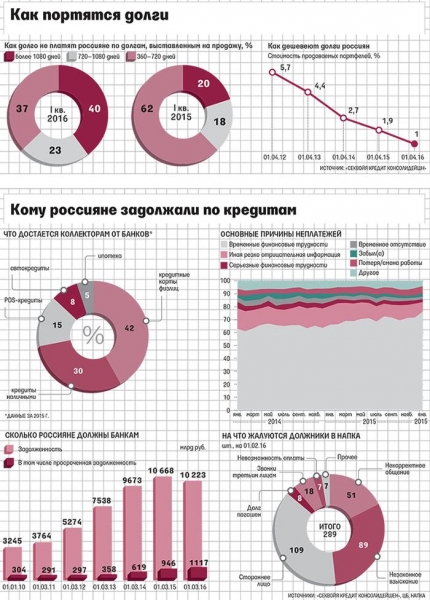
Russia’s Supreme court took a momentous decision: he actually forbade banks to transfer the collectors information on loans without the consent of the debtors.
In a particular case Russia’s Supreme court has questioned the right collection Agency to demand from the debtor repayment of the debt. Reason: unclear on what basis the Bank gave the collector the right to demand the debt. Clear and explicit consent from the debtor was not. This means that the Bank knowingly declassified their problems.
Bankers and collectors – especially collectors! – often forgetting the information, who has any loans, is banking secrecy. It should be protected from outsiders, and collectors here that other people have.
In recent times, collectors have managed to do the seemingly impossible: they discredited the correct and indisputable idea that debts must be given. When debtors start to beat and rape, when the Windows arrive grenades, and children of debtors burn in the cradle, the phrase about the need to pay the bills of the Bank seems to be meanness. As it is impossible after all the nightmares that happened and still happen, to say that somewhere civilized collectors, and they say, you cannot cast a shadow. No, shadow’s turned on all the collection community.
Legally collectors today impostors. Their activities are not regulated by law. Only yesterday the state Duma adopted in the first reading the bill collectors.
Therefore, even when the collectors use legal steps, for example, trying through the courts to recover money from the debtor, their authority is questionable.
In this case, some collection Agency has sued two of the debtors, a married couple who bought a car on credit. First instance dismissed the action. However, the second instance sided with the collectors and recover from the debtors 285 thousand rubles of principal debt, thousand rubles 73 percent, almost 10 thousand rubles of legal expenses. In addition, people took a car for sale for debt. The selling price was set at 332 thousand rubles.
However, the Supreme court did not agree with the decision of the appeal. The fact is that according to the law on consumer protection does not provide for the right of the Bank, other credit organizations to transfer the right of claim under a loan agreement to any third party without license to carry out banking activities, unless otherwise provided by law or contract containing the condition that is agreed between the parties at its conclusion. Simply put, the debtor must consent to the transfer of information to collectors.
This is generally prescribed in the contract. However, there are some nuances.
In this case, the Bank clearly prescribed conditions. It appeared that information could be transferred to collectors or with the written consent of the debtor or with the written consent of the Bank. The Supreme court, after analyzing the provisions of the contract, decided that the conditions for the transfer of information to third parties cannot be considered consistent. The decision of the appeal was reversed and the case remanded for a new trial.
According to lawyers, all banks in the contracts, different wording, different banks are quite clearly prescribed so that the borrower’s consent to the assignment of any third parties was unlimited. But the legitimacy of such points is in serious doubt, especially in light of recent events.
“Information constituting banking secrecy may be provided only to the clients themselves or their representatives and submitted to the Bureau of credit histories on the grounds and in the manner provided by law, says lawyer Vyacheslav Golenev. – State bodies and their officials such data can be provided only in cases and order stipulated by the law”.
We will remind that yesterday the state Duma adopted in the first reading the bill limiting the work of collectors. Only the Parliament had more than a dozen projects on this topic. The government shall determine the authority responsible for maintaining a register of reservoirs, the regulation and control of activities on debt collection. The debtor to call the collector will be able not more than twice a week-to-face meetings – no more than once a week.
The Federal chamber of advocates proposes to introduce the procedure of confirmation of qualification and a code of ethics for collectors. In addition, according to the AFP, it is necessary to form a corporate community of these individuals.








